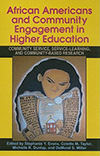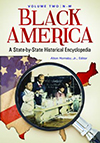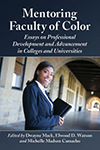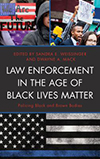Vice President for Diversity, Equity and Inclusion;
Professor of History
Contact Information
Lincoln Hall, 301
CPO 2027
Email: mackd@berea.edu
Phone: 859-985-3369
Spring 2022
Office Hours
Mon/Wed/Fri: 9 – 11 a.m.
Tue: 3 – 4 p.m.
Thur: 10 a.m. – noon
Class Schedule
- AFR/HIS 165 (Tue/Thur: 1:00 pm – 2:50 pm)
- HIS 162 (Mon/Wed: 12:40 pm – 2:30 pm)
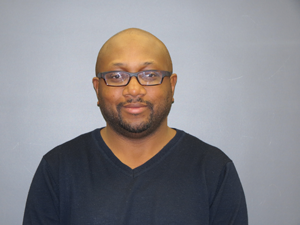
Degrees
- B.A., Methodist College, 1993
- M.A., North Carolina Central University, 1996
- Ph.D., Washington State University, 2002
Honors and Awards
- Summer 2005 – Undergraduate Research and Creative Projects Program, Berea College
- Spring 2005 – Served as African American specialist for a NEH Grant, Columbia Basin College, Pasco, WA
- Summer 2004 – Undergraduate Research and Creative Projects Program, Berea College
- Fall and Spring 2003/04 – Professional Growth Grant, Berea College
Special Interests
Raising our four children: Charity, Liberty, Jelani, and Kosey
Affiliations
- Association for the Study of African American Life and History /Phi Alpha Theta/Southern
- Southern Conference on African American Studies
Publications
African Americans and Community Engagement in Higher Education by Stephanie Y. Evans (Editor); Colette M. Taylor (Editor); Michelle R. Dunlap (Editor); DeMond S. Miller (Editor)
Call Number: 378.103 A258a 2009 (Location: CELTS Library — Stephenson Hall)
Publication Date: 2009
“We’ll understand it better by and by: a three-dimensional approach to teaching race through community engagement” by Meta Mendel-Reyes and Dwayne A. Mack
Beginning a Career in Academia – A Guide for Graduate Students of Color by Dwayne A. Mack (Editor); Elwood Watson (Editor); Michelle Madsen Camacho (Editor)
Call Number: 378.198 B417 2015 (Location: BC Scholarship Collection)
Publication Date: 2015
This practical guide prepares graduate students of color for their first job in academia and offers strategies for succeeding in the early years of a tenure-track position. Through the voices of faculty who have experienced the rigors of the job search and a career in academia, Beginning a Career in Academia offers advice for graduate students of color on how to transition from graduate school to an academic position. This inclusive volume shares perspectives that vary based on gender, racial, ethnic, generational, and disciplinary backgrounds, giving readers an opportunity to reflect on successful strategies for career readiness and for dealing with marginalization. The authors provide recommendations and tips to enhance the job search, identify campus fit, prepare for the interview and negotiation process, address dynamics of of racial and gender politics, find work-life balance, and demystify the promotion and tenure process. This must-read provides candid advice and mentorship for any graduate students of color embarking on a career in academe.
Black America by Alton Hornsby (Editor)
Call Number: 973.049 B6265 2011 (Location: Reference)
Publication Date: 2011
“Blacks in Kentucky” by Dwayne Mack
Black Spokane by Dwayne A. Mack
Call Number: 305.896 M153b 2014 c. 2 (Location: BC Scholarship Collection)
Publication Date: 2014
In 1981, decades before mainstream America elected Barack Obama, James Chase became the first African American mayor of Spokane, Washington, with the overwhelming support of a majority-white electorate. Chase’s win failed to capture the attention of historians—as had the century-long evolution of the black community in Spokane. In Black Spokane: The Civil Rights Struggle in the Inland Northwest, Dwayne A. Mack corrects this oversight—and recovers a crucial chapter in the history of race relations and civil rights in America.
As early as the 1880s, Spokane was a destination for black settlers escaping the racial oppression in the South—settlers who over the following decades built an infrastructure of churches, businesses, and social organizations to serve the black community. Drawing on oral histories, interviews, newspapers, and a rich array of other primary sources, Mack sets the stage for the years following World War II in the Inland Northwest, when an influx of black veterans would bring about a new era of racial issues. His book traces the earliest challenges faced by the NAACP and a small but sympathetic white population as Spokane became a significant part of the national civil rights struggle. International superstars such as Louis “Satchmo” Armstrong and Hazel Scott figure in this story, along with charismatic local preachers, entrepreneurs, and lawyers who stepped forward as civic leaders.
These individuals’ contributions, and the black community’s encounters with racism, offer a view of the complexity of race relations in a city and a region not recognized historically as centers of racial strife. But in matters of race—from the first migration of black settlers to Spokane, through the politics of the Cold War and the civil rights movement, to the successes of the 1970s and ’80s—Mack shows that Spokane has a story to tell, one that this book at long last incorporates into the larger history of twentieth-century America.
Making of the American West by Peter Mancall (Editor); Benjamin Heber Johnson (Editor)
Call Number: E-book
Publication Date: 2007
“The Black West” by Dwayne Mack
Mentoring Faculty of Color by Dwayne Mack (Editor); Elwood D. Watson; Michelle Madsen Camacho (Editor)
Call Number: 378.12 M549 2013 (Location: BC Scholarship Collection)
Publication Date: 2013
The 14 new essays in this collection come from underrepresented faculty who teach at predominantly white colleges and universities. This book discusses both the tenure and promotion experiences of faculty of color and is not racial, ethnic, gender, cultural or discipline specific. The book is thus not only for aspiring graduate students of color and faculty of color desirous of outside mentoring, but is also aimed toward administrators interested in the professional development and dilemmas of faculty of color. As they share their reflections and strategies firsthand, faculty of color describe how they navigated the complex terrain of higher education to achieve tenure or promotion. Most of the contributors are at the associate professor stage of their careers and some hold the rank of full professor. In their narratives they discuss their personal identity, professional backgrounds, and life experiences as they relate to their journeys through the tenure and promotion process.
Splendid Service by Orlan J. Svingen (Editor)
Call Number: 355.3709 S761 2010 (Location: BC Scholarship Collection)
Publication Date: 2008
“The Vietnam era, 1965-1975” by Dwayne A. Mack
Violence Against Black Bodies by Sandra Weissinger (Editor); Elwood Watson (Editor); Dwayne A. Mack (Editor)
Call Number: 305.896 V795 2017 (Location: BC Scholarship Collection)
Publication Date: 2017
Violence Against Black Bodies argues that black deaths at the hands of police are just one form of violence that black and brown people face daily in the western world. rough the voices of scholars from different academic disciplines, this book gives readers an opportunity to put the cases together and see that violent deaths in police custody are just one tentacle of the racial order;a hierarchy which is designed to produce trauma and discrimination according to one’s perceived race-ethnicity.
There is a reason why people claim great respect for officers of the law: the job, by description, is hard–if not deadly. It takes a certain kind of person to accept the consequences of the job– seeing the very worst situations, on a regular basis, and knowing that one’s life is on the line every hour of every day. Working in law enforcement is emotionally and psychologically draining. It affects these public servants both on and off the job. Said plainly, shaking an officers’ hand when you see them or posting a sign in the front yard that reads “Support the Badge” is lip service. Even going as far as to donate money to a crowdsourcing fundraising site does little to support the long-term professional development needs of officers. These are surface level signs of solidarity, and do little in terms of showing respect for the job and those who do it. For those who want to do more, this text provides reasons and a rationale for doing better by these public servants. Showing respect does not mean that one agrees with whatever another person or institution claims to be the “right” way. Showing respect and admiration means that we charge individuals to live up to their fullest potentials and integrate innovation wherever possible. In the case of policing in the era of Black Lives Matters, policing as usual simply is not an option any longer. It is disrespectful, to both the officers and those who are being policed, to rest on the laurels of past policing tactics. As we enter a time period in which police interactions are recorded (dash cams or body cams, for example) and new populations are being targeted (Latinx people), there is much to learn about what is working and what is not.
